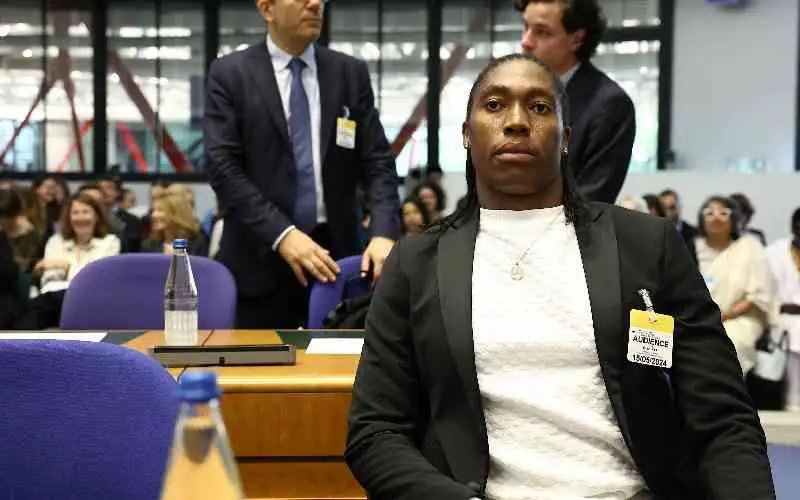Top European court rules Semenya was denied fair trial, stops short on discrimination finding

The decision comes as the gender debate resurfaces in global sport, following a controversy at the 2024 Paris Olympics involving Algerian boxing champion Imane Khelif, and as the International Olympic Committee considers reviving gender testing policies.
The European Court of Human Rights (ECHR) on Thursday ruled that Swiss courts failed to give Caster Semenya, a two-time Olympic gold medalist, a fair hearing when she challenged rules requiring her to lower her natural testosterone levels to compete in women’s events. However, the court did not establish whether the South African athlete suffered discrimination.
The decision comes as the gender debate resurfaces in global sport, following a controversy at the 2024 Paris Olympics involving Algerian boxing champion Imane Khelif, and as the International Olympic Committee considers reviving gender testing policies.
Semenya, 34, has a condition known as "differences in sexual development" (DSD) but has always been legally identified as female. She has been barred from competing in her signature 800m event since 2018 after refusing to take hormone-suppressing drugs under regulations imposed by World Athletics.
“This is a positive outcome,” Semenya told reporters after the ruling. “We need to respect athletes and put their rights first.” The runner, who claimed Olympic gold in 2012 and 2016 and won world titles in 2009, 2011, and 2017, said the decision serves as a reminder to sports authorities that "priorities lie in the protection of athletes."
Semenya's legal battle spans several years. In 2019, the Court of Arbitration for Sport (CAS) in Lausanne ruled against her, a decision upheld by the Swiss Federal Court in 2020. The courts argued that higher testosterone levels provided athletes like Semenya with an “insurmountable advantage” over other women competitors.
But the ECHR said the Swiss judiciary failed to apply a sufficiently rigorous review in Semenya’s case, breaching her right to a fair trial under the European Convention on Human Rights. The court ordered Switzerland to pay her €80,000 (approximately $93,000) to cover legal expenses.
While a lower chamber of the ECHR had found in 2023 that Semenya was a victim of discrimination, that ruling was appealed by Swiss authorities with backing from World Athletics. The Grand Chamber’s final ruling concluded that questions of discrimination could not be addressed as they fell outside Switzerland’s legal responsibility.
Sports law expert Seema Patel called the ruling “a missed opportunity,” saying the court “didn't go far enough to recognise all violations in this case.” However, she noted it sent a clear message that human rights standards must be respected in sport.
Legal scholar Antoine Duval added that the ECHR’s decision suggested the World Athletics rule may be disproportionate and could open the door for new challenges by intersex athletes.
DSDs—conditions involving variations in chromosomes, hormones, or reproductive organs—are rare and occur in roughly one in 1,000 to 4,500 births. Semenya was born with the “46 XY” chromosome pattern, typical in males, but was legally identified female at birth.
Before winning her first world title in 2009 at age 18, Semenya was subjected to gender testing and placed on medication to lower her testosterone—an experience she later described as feeling like a “human guinea pig.” She has since vowed never to undergo such treatment again.
While testosterone is produced by both sexes, men generally produce 20 times more. Yet, the extent to which elevated testosterone enhances performance remains scientifically contested.
The gender debate has gained fresh momentum, with the IOC reconsidering gender verification. World Athletics and World Boxing now employ chromosomal testing, often via cheek swabs to detect the Y chromosome. In 2023, World Aquatics adopted a similar policy.
Proponents argue such testing offers clarity and fairness in women’s competition. UN Special Rapporteur Reem Alsalem described the tests as “reliable and non-invasive.”
Critics, however, including sociologist Madeleine Pape, argue there’s insufficient evidence that DSD athletes have an unfair edge over XX competitors. Human Rights Watch has condemned the World Athletics policy as “degrading, invasive, and scientifically questionable.”
The topic flared again in June when questions around the gender of Olympic boxing champion Imane Khelif drew global attention. Public figures including Donald Trump and author J.K. Rowling added fuel to the controversy.
